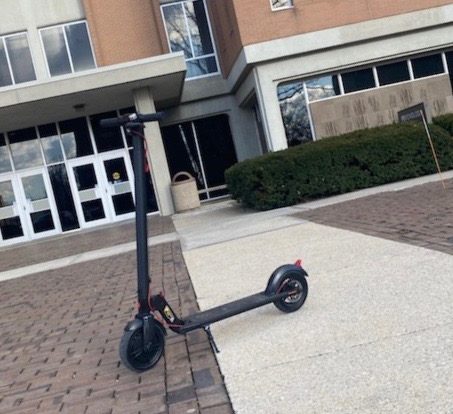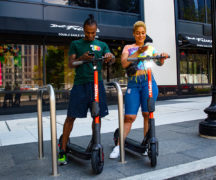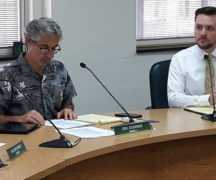Bowling Green is preparing for an orderly influx of electric scooters in the city.
On Tuesday, Bowling Green City Council will hear the first reading of an ordinance regulating shared electric scooters.
The state of Ohio has passed legislation allowing the use of electric scooters and authorizing local jurisdictions to pass additional regulations as they see fit – otherwise the state law governs.
City staff studied the Bowling Green State University policy on e-scooters, as well as legislation adopted in other Ohio cities. The goal is “to ensure that such mobility sharing systems are consistent with the safety and well-being of the citizens of Bowling Green.”
The legislation requires that the scooters come with a forward pointed lamp, a back reflector, and lists the following operating rules:
- Cannot be operated on sidewalks, except as permitted by BGSU.
- Cannot be operated on streets or highways with speed limits higher than 35 mph.
- Cannot exceed 20 mph.
- Riders must be at least 18 years old.
Based on experiences in other communities, Bowling Green’s legislation establishes parking regulations so that the scooters do not impede ADA accessibility.
Following are some provisions of the proposed e-scooter ordinance:
- Any business seeking to operate a shared electric scooter program within the city shall first enter into an agreement with the city.
- Providers shall provide easily visible contact information, including toll-free phone number and email address on each scooter for city employees and the public to report problems.
- The city reserves the right to terminate the “use agreement” for cause or woefully negligent practices.
- Providers will take reasonable steps to ensure that all riders understand the requirements of ADA accessibility and the importance of leaving ADA paths of travel clear and accessible.
- Providers may stage e-scooters in permitted parking areas. If a provider wants to stage in areas other than the public right-of-way, permission must be obtained from the city, property owner or public agency.
- Providers must adhere to all indemnification and insurance requirements.
The ordinance also outlines some restrictions for operating the e-scooters.
- No more than one rider will be allowed at a time.
- Riders must not carry items that require both hands.
- The scooters may be operated on shared bicycle/pedestrian ways, including on shared pathways in public parks and streets. Anyone riding an e-scooter on a bicycle/pedestrian pathway, and is approaching a pedestrian, should give an audible warning and yield to the pedestrian – dismounting if necessary.
- E-scooters are to stay on the right of street lanes, and offer the right of way to bicycles in bike lanes.
Parking requirements:
- Riders of e-scooters should park the devices upright on hard surfaces on the curb of the sidewalk, beside a bike rack, or in another area specifically designated for bicycle parking, or on the street next to an unmarked curb.
- Riders should not park scooters in such a manner as to block the pedestrian clear zone area of the sidewalk, or ADA paths of travel.
- Riders should not park the scooters where they interfere with the reasonable use of a commercial window display, or access to any building entrance.
- Riders may park e-scooters in on-street parking spaces in the following circumstances – when designated for scooters, where the curb is less than 3 feet wide, in neighborhoods with rolled curbs or inadequate sidewalk space, and in marked parking spaces designated for motorcycles.
A recent BGSU graduate presented his plan for an electric scooter business to Bowling Green City Council and to BGSU officials earlier this spring.
Shakir Blackett and Seth Crosby, of Micro-mobility, said the scooters would offer affordable transportation on the small lightweight vehicles. The scooters are seen in many larger cities, but Blackett said efforts are increasing to get into smaller communities. The scooters create less traffic congestion, less pollution, and are fun to ride, he said.
BGSU is interested in the business, but is waiting for the city to get on board, Blackett said.
The company plans to have a fleet of 50 scooters available for rent by next spring.
Blackett and Crosby both graduated from BGSU this May – Blackett in aviation engineering technology and Crosby in supply chain management.
The project has been in the works for more than a year, delayed as was the case with so much by the pandemic. They did research and acquired two prototype bikes and recruited people to take test runs around campus.
[RELATED: Recent BGSU grads charged up about bringing electric scooters to campus & community]



